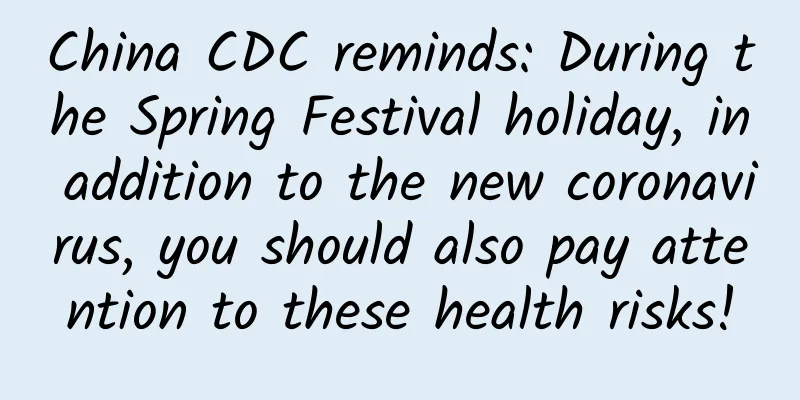China CDC reminds: During the Spring Festival holiday, in addition to the new coronavirus, you should also pay attention to these health risks!

|
The Spring Festival is approaching. The mobility of people will increase around the Spring Festival, and more people will return home, and more family and friends will reunite and travel. The Chinese Center for Disease Control and Prevention reminds: During the 2023 Spring Festival, the relatively high-risk infectious diseases in mainland China include novel coronavirus infection, seasonal influenza, and norovirus enteritis. In addition, attention should be paid to the risks of food poisoning and carbon monoxide poisoning. When traveling abroad, special attention should be paid to the risks of infectious diseases such as novel coronavirus infection, cholera, norovirus enteritis, and dengue fever. 01 Novel Coronavirus Infection The novel coronavirus is mainly transmitted through respiratory droplets and close contact, and can be transmitted through aerosols in closed environments, and can also be caused by contact with objects contaminated by the virus. After the onset of the disease, the main symptoms include fever, chills, dry cough, fatigue, myalgia, nasal congestion, runny nose, sore throat, decreased or loss of smell and taste, diarrhea, etc. At present, the epidemic is still in the epidemic stage in my country, and the global epidemic is also continuing to spread. Recently, new mutants have appeared in some countries and regions, which are highly contagious, and the epidemic situation has an upward trend. During the Spring Festival, with the increase in returning home, visiting relatives and friends, and traveling at home and abroad, the mobility of people has increased, which has increased the chance of virus transmission and spread. People who have not been infected are likely to be infected, and long-distance travel is not conducive to the recovery of people who are in the process of recovery after infection. The public still needs to pay attention to and do a good job in preventing new coronavirus infection. Main preventive measures: (1) People who have been infected with or have not yet been infected with the new coronavirus need to continue to maintain good personal protection habits and be the first person responsible for their own health. Wearing masks, washing hands frequently, and gathering less can not only prevent new coronavirus infection, but also prevent other respiratory infectious diseases. (2) During the Spring Festival, we encourage people to travel at off-peak times. If you have been infected but have not tested negative, we recommend that you do not go out, return home, or travel. If you return home, do not participate in gatherings. (3) Returnees, if their infection status is unclear, should protect their families, especially if there are elderly people or patients with underlying diseases at home. For example, if they live in separate rooms, when contact is necessary, they should wear masks, keep their distance, and minimize contact time. (4) Returnees who have not been infected and their families should monitor their health. If they have respiratory symptoms such as fever and cough, they should be isolated at home and not go out. If conditions permit, they should conduct antigen testing on their own and seek medical treatment when necessary. (5) People in the recovery period should pay attention to the regulation of daily life, regular work and rest, a reasonable and nutritious diet, and keep warm. Reduce long-distance travel, and seek medical treatment in a timely manner if COVID-19-related symptoms persist or the condition changes. (6) Those who meet the conditions for COVID-19 vaccination should complete the full course of vaccination and booster vaccination as soon as possible. The interval between the time of infection and the time of COVID-19 vaccination for confirmed infected persons should be at least 6 months. (7) Travellers going abroad should check the prevention and control management policies and measures of the destination in advance and make relevant preparations. (8) After the trip, returnees should monitor their own health. 02 Seasonal Flu Seasonal influenza is mainly transmitted through respiratory droplets, and can also be transmitted through direct or indirect contact with mucous membranes such as the mouth, nose, and eyes. It generally presents with acute onset, often with fever, accompanied by chills, chills, headache, muscle and joint pain, extreme fatigue, loss of appetite and other systemic symptoms, often with sore throat and cough, nasal congestion, runny nose, discomfort behind the sternum, facial flushing, mild congestion of the conjunctiva, vomiting, diarrhea and other symptoms. It lacks specificity and is easily confused with the common cold and other upper respiratory tract infections. Most cases are mild, and a few are severe. The high-risk groups for severe illness and death are mainly pregnant women, infants, the elderly or patients with chronic underlying diseases. Main preventive measures: (1) Annual influenza vaccination is the most effective way to prevent influenza and can significantly reduce the risk of influenza and severe illness. It is recommended that pregnant women, children aged 6 months to 5 years, the elderly aged 60 years and above, patients with chronic underlying diseases and other high-risk groups for influenza, family members and caregivers of infants under 6 months old, and medical staff receive influenza vaccination. (2) Daily protective measures can also effectively reduce the infection and spread of influenza, including: maintaining good respiratory hygiene habits, covering your mouth and nose with tissues or towels when coughing or sneezing; washing hands frequently, and avoiding touching your eyes, nose or mouth with your hands as much as possible; eating a balanced diet, exercising moderately, and getting enough rest. Avoid close contact with patients with influenza-like symptoms, and try to avoid crowded places during the influenza epidemic season; after influenza-like symptoms appear, patients should be isolated and observed at home, and wear masks when contacting family members to reduce the spread of the disease; when patients with influenza-like symptoms go to the hospital for treatment, patients and accompanying personnel should wear masks to avoid cross infection. 03 Norovirus enteritis Norovirus enteritis can occur throughout the year, with a higher incidence in winter and spring in my country. Norovirus enteritis is prone to cause outbreaks in crowded places such as schools, kindergartens, and hospitals. Outbreaks also often occur in tour groups, cruise ships, and holiday centers. Norovirus can be transmitted from person to person, through food, and through water. The most common symptoms are vomiting and diarrhea, followed by nausea, abdominal pain, headache, fever, chills, and muscle aches. Most cases are mild and recover within 2-3 days of onset; very few cases can lead to severe illness or even death, usually in the elderly and young children. Main preventive measures: (1) Wash your hands frequently, especially before meals, after defecation, and before processing food. (2) Pay attention to food and water hygiene. Eat cooked food as much as possible. Do not eat raw or undercooked meat, seafood, or vegetables. Wash and peel fruits before eating. Drink boiled water or unopened pre-packaged water or beverages. (3) People infected with Norovirus should be isolated from the time of illness to within 3 days after recovery. Those with mild symptoms can be isolated at home or in the institution where the epidemic occurs, while those with severe symptoms need to be sent to a medical institution for isolation and treatment. (4) Surfaces contaminated by the patient's vomit or feces should be cleaned and disinfected promptly with chlorine-containing disinfectants or other effective disinfectants, and contaminated clothing or bed sheets should be taken off and washed immediately. Rubber or disposable gloves should be worn when cleaning, and hands should be washed carefully after cleaning. 04 Food poisoning During holidays, the number of gatherings and dining out increases, and the risk of food poisoning also increases accordingly. In my country, food poisoning caused by microorganisms is the most common, but other poisonings such as wild mushrooms and wild plants also occur from time to time. Food poisoning usually occurs acutely within a short period of time after a meal, with gastrointestinal symptoms such as nausea, vomiting, abdominal pain, and diarrhea. Main preventive measures: (1) Wash your hands frequently, especially before meals, after defecation, and before processing food. (2) Choose fresh and safe food ingredients, and keep raw and cooked food separate during processing. (3) When dining out, be sure to choose a regular restaurant with good hygiene conditions. (4) Do not eat uncooked or undercooked food, unclean fruits and vegetables, food of unknown origin, or unknown wild mushrooms and wild plants. 05 Carbon monoxide poisoning Carbon monoxide is a colorless, odorless, non-irritating asphyxiating gas. The peak season for non-occupational carbon monoxide poisoning in my country is winter and spring, which coincides with the coal-fired heating season in the north. The provinces with the highest incidence are mainly distributed in the northeast, north China, and the east-central regions. The main place where non-occupational carbon monoxide poisoning occurs is the home. The main risk factors include the use of coal stoves, charcoal fires, earthen beds, fire walls, etc. for heating in poorly ventilated environments, improper use, installation or substandard quality of gas or coal water heaters, gas leaks from gas stoves or gas pipelines, etc. In addition, restaurants and hotels using charcoal fires, gas, and coal gas, garages and basements using small oil or gas generators, and closed air-conditioned cars are also high-risk places. The main symptoms of mild poisoning patients are headache, dizziness, tinnitus, blurred vision, nausea, vomiting, limb weakness, etc.; moderate poisoning patients, on the basis of mild poisoning symptoms, also have cherry red skin and mucous membranes, flushed face, sweating, accelerated pulse, confusion, unsteady walking, blurred consciousness, drowsiness, decreased judgment, hallucinations, shallow coma, slow light reflex and corneal reflex, etc.; severe poisoning patients have deep coma or cerebral cortex denervation state, various reflexes are significantly weakened or disappeared, incontinence, cold limbs, pale lips and face or cyanosis, sweating, fever, blood pressure drop, respiratory depression. After mild and moderate poisoning, quickly leave the poisoning environment and rescue in time, generally there are no sequelae; severe poisoning patients have a high mortality rate, and survivors may have serious sequelae. Main preventive measures: (1) In cold seasons, choose central heating if possible. When using coal stoves or charcoal fires, gas or coal-fired water heaters, gas or coal-fired stoves, or small oil or steam generators, good ventilation should be maintained. It is best to install carbon monoxide detectors and conduct regular inspections and maintenance. When parking your vehicle in a garage or basement, do not leave the engine running continuously; when the vehicle is parked, do not turn on the air conditioner for a long time, and do not sleep in a car with the doors and windows closed and the air conditioner on. (2) Once non-occupational carbon monoxide poisoning occurs, open windows for ventilation immediately, quickly turn off gas, fuel gas, charcoal fire and other facilities and equipment, and quickly transfer the poisoned person to a place with fresh air and good ventilation and keep warm. Call 120 emergency number as soon as possible and perform hyperbaric oxygen chamber treatment as soon as possible. For critically ill patients with respiratory and cardiac arrest, artificial respiration and cardiac compression should be given immediately. 06 cholera In 2022, cholera outbreaks occurred in some countries in Africa, America and Asia, among which Malawi, Cameroon, Somalia, Haiti, Pakistan, Syria, Lebanon, Bangladesh, Afghanistan and other countries were severely affected. Cholera is an intestinal infectious disease that is mainly transmitted through contaminated water or food. The main symptoms are acute watery diarrhea and vomiting. If not treated promptly or appropriately, it can lead to severe dehydration or even death. Main preventive measures: (1) Wash your hands frequently, especially before meals, after defecation, and before processing food. (2) Pay attention to food and water hygiene. Eat cooked food as much as possible. Do not eat raw or undercooked meat, seafood, or vegetables. Wash and peel fruits before eating. Drink boiled water or unopened pre-packaged water or beverages. (3) If you must travel to an area where a cholera outbreak has occurred, taking an oral cholera vaccine before traveling may have a certain preventive effect. 07 dengue Dengue fever is a common infectious disease in tropical and subtropical countries and regions. Travelers are at risk of contracting dengue fever when traveling to Southeast Asia, Africa, the Caribbean, Central and South America, Pacific island countries, and Australia. Dengue fever is mainly transmitted through mosquito bites. The incubation period is 3-15 days. The main symptoms include fever, headache, orbital pain, joint and muscle pain, nausea, vomiting, rash, and mild bleeding. Severe cases may cause bleeding, shock, organ failure and even death. Main preventive measures: (1) Wear loose-fitting, light-colored, long-sleeved tops and long pants. (2) Spray effective mosquito repellent on your skin and clothing. (3) Try to stay in a hotel with air conditioning or screens. If the place you are staying does not have air conditioning or screens, it is best to use mosquito coils or mosquito repellent aerosols and use mosquito nets. Source: Beijing Daily Comprehensive China Disease Control News The cover image of this article is from the copyright gallery and is not authorized for reproduction |
<<: All flights in the United States are grounded. Is the culprit really an "epic" solar flare?
>>: [Creative Cultivation Program] Brain-computer interface: Feel everything without leaving home
Recommend
Does the weight loss drug semaglutide shrink the heart? Scientists offer suggestions →
Compiled by: Gong Zixin "Magic weight loss d...
Let's talk about phantom types in Swift
Preface Ambiguous data is arguably one of the mos...
How did Wu Chunhong receive more than 2.62 million yuan in state compensation? What is the specific situation?
How did Wu Chunhong receive more than 2.62 millio...
2016 Global APP Survival White Paper Released: Big Data Explains the Rise and Fall of 4 Million+ APPs!
2016 was the year when the domestic mobile Intern...
Selection of the most popular bestie sentences on Tik Tok 100 most popular bestie sentences on Tik Tok
This article mainly introduces 100 of the most po...
New media operation: How to create a "million-dollar" self-media matrix?
Many students would say: It’s 2020, can self-medi...
Attention! Heavy rain + thunderstorm + hail is coming!
Today (June 14), heavy rainfall continues in the ...
Take a walk! Strolling for 5 minutes every half an hour can better offset the harm of sitting for a long time
Generally speaking, a person uses less energy whe...
Prepare for 618! The latest Baidu search & information flow advertising guide!
The biggest e-commerce promotion in the first hal...
Understand two top chips in one article - Can Apple A13 beat Kirin 990?
For many technology fans, Apple's autumn conf...
How should an operator plan an inventory H5?
The day before yesterday, the WeChat report was f...
Three key factors that determine the success or failure of the 2015 mobile chip war
The MWC2015 World Mobile Communications Exhibitio...
Promotion or manipulation? Uncovering the secrets of manipulation of the rankings of trial software
Just tap on your phone to download a few apps and...
Osmanthus is so fragrant, why is it wrong to make it into osmanthus-scented perfume?
This autumn, I was wrapped tightly in the fragran...
How do emerging social tools break the monetization curse? Here are 3 suggestions
Meitu XiuXiu, which is considered to best represe...









